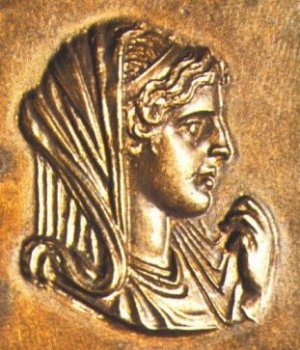Antipatros strikes back

The decision of the ekklesia to hold back the army at the Sperchus River was to prove crucial for the development of the war. Leosthenes grew impatient as the Thessalians refused to join him, after it became known that the Epirote King Aiakides, his daughter’s spouse, had joined the Macedonians. This news was a shock to some of the Greeks, as Epirus had usually stayed neutral in Greek affairs. Most possibly the reason for the intervention was an attempt by Aiakides to gain the trust of the Macedonians, so that his Kingdom wouldn’t be the next target of a their possible new conquests. And after all, he was related to the family of Megas Alexandros.
Realizing the need for reinforcement troops, Antipatros called upon the subjugated tribes of the North to send troops to assist him in battle. Much to his dismay, neither of the Barbarian kings showed up, and instead sent a contingent of 1,000 Light Cavalry each. But this was nevertheless a valuable addition to the Macedonian force, especially because the Greeks lacked in cavalry due to the Thessalians staying loyal. Together with the Barbarians, Antipatros marched onto Larissa in Thessaly, where he was joined by the Hipparch Menon and his exalted Thessalian cavalrymen.
Meanwhile, the Epirotes departed Molossia under the leadership of King Aiakides. The journey over to Thessaly would pass mountainous and rugged terrain, inhabited by the Athamanians, who many regarded as barbarians. While moving through a mountainous pass, the Epirotes were ambushed by a contingent of light infantry and skirmishers, who caused considerable havoc to the advancing column. The Athamanians demanded that Aiakides pay them a decent sum of talents in order to pass. The King refused, and a battle ensued. Unknown to the Athamanians, the Epirotes knew how to deal with a light tribal army. They had fought in the defence of Magna Graecia, and against the Illyrians. The veteran hoplites cleared the pass for Aiakides’ army, and the Athamanians withdrew. However, the casualties were heavy, and the journey was delayed. Aiakides and his officers swore to avenge this later.
As winter starts to close, and there is no sight of the Epirotes, the Macedonian officers started to grow uneasy. Many demanded Antipatros to take action before they have to set up winter quarters. The urges to move south were also backed by intelligence, as spies reported of discontent among the Greek ranks due to the failure to win a decisive engagement. Finally Antipatros agreed, and the Macedonians and their allies marched to the city and fortress of Lamia, and started sending skirmishers to the river in order to scout the Greek positions. Due to the winter closing in, the Greeks had already gone into camp. After Aiakides finally arrived with his Epirotes, Antipatros grew more confident. He launched a night party over the river, engaged a few Greek camps, causing heavy casualties with little losses of his own men.
Leosthenes then decided to have his revenge and sent a counterattack over the river into Thessaly proper, against the wishes of Athens. Antipatros was waiting. On another flank he had the Epirotes and Taulantians, on another the Thessalians and the Paionians. In the middle he put his phalanx, backed by lighter infantry. Both flanks sent their infantry and light cavalry to harass the advance of the Greek hoplites, creating gaps in their formations. The Thessalian, Epirote and Macedonian cavalry then made use of this, striking heavy blows to the hoplites, and fully routing the Aetolian cavalry. Leosthenes had no other chance than to call a retreat. The Greek lines were thrown into utter chaos, and many were cut down as they made their way back across the river to their camp. This brief engagement had proven victorious, yet costly in manpower, for Macedonians, and Antipatros set up camp at Lamia. But it was far from a decisive battle bringing a quick end to the war. However, the Greek army was greatly brought down in numbers, now numbering little over 15,000 men, of whom many had a weak morale.
While the Athenians had definitely hesitated on the land, on the sea they were very active. After the Athenian navarchs noticed a complete lack of Macedonian naval activity, they could switch their shipping escorting the grain convoys from the north to offensive action. The ekklesia approved a daring plan, and a notable army of Athenian citizen hoplites as well as triremes gathered in Piraeus. The Athenian navy sailed, and occupied Naxos as well as other minor islands. The citizens of these islands secretly supported the Greek uprising, and were swiftly taken over due to lack of powerful Macedonian garrisons. After gaining encouragement due to their successes, the Athenians launched a powerful attack on Rhodes. The Rhodians also detested the Macedonian ruled, and set into motion an uprising. The small Macedonian garrison was able to withdraw to Halicarnassos, and urged the satraps to actually notice the severity of the situation. The Aegean was now undoubtedly under Athenian domination, and would have severe impact on Macedonian trade.
In Epirus nobles left behind by Aiakides started to recruit new soldiers to bolster the army of the Kingdom. Molossian men were paid lavishly for joining new regiments of light hoplites and skirmishers. Antipatros himself put into motion a mobilization, too. He was able to bring around the few still unrecruited Thessalians and Macedonians to join his army as phalangites and skirmisher infantry. He had also spent most of the time in Thessaly with his fellow commanders and soldiers, building up morale. The old general was a man respected by all, and the army would definitely die for him and their Kingdom if necessary.
The threat of the Athenian navy was taken into account, and vast ship construction was launched. None of the ships however were finished in time to defend the Aegean, but would soon be ready to take action. The construction along the Macedonian coast however met considerable failure, as daring Athenian raids damaged the shipyards, while the Macedonian fleet already on sea remained idle in port. 50 triremes were finished by Philotas, and 50 by Krateros in Cilicia. An additional 50 Triremes and 50 Penteres were expected to be finished in Macedonia by spring. If used well, this fleet could pose a serious opponent to the pride of Athens, though even they had been able to build new ships, and gather naval reinforcements from other poleis. The Hellenic War would only get bloodier from now on.
[-1,000 Cavalry, -1,000 Infantry to Aiakides, -1,000 Light Infantry, -2,000 Heavy Infantry to Antipatros, +3,000 Light Infantry, +3,000 Heavy Infantry available by spring for Antipatros, +2,000 Light Infantry to Aiakides by spring ]
[-10,000 Drachma to Aiakides, -40,000 Drachma to Antipatros, no trade income for Asandros, Menandros and Leonnatus until the control of the Aegean is won back]
[+50 Triremes to Philotas, +50 triremes to Krateros, -25,000 Drachma to both, Philotas’ triremes under Krateros’ control for time being, +50 Triremes, +50 Penteres to Antipatros by spring, -80,000 Drachma to Antipatros ]








